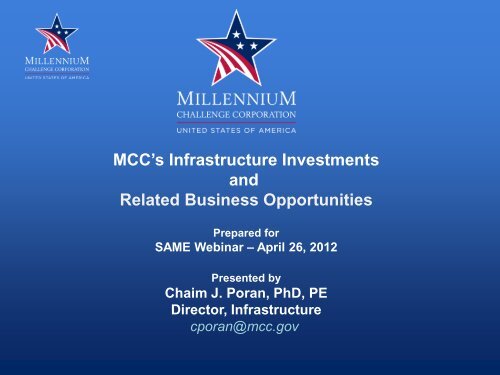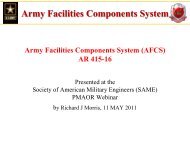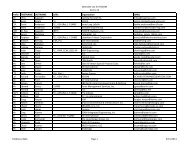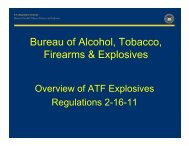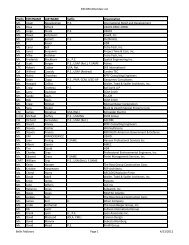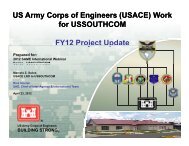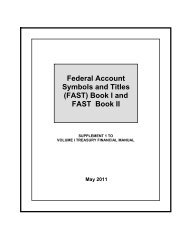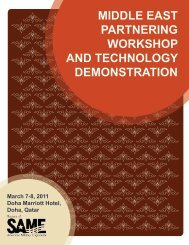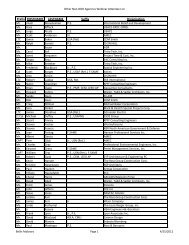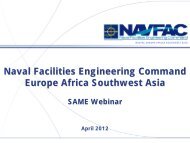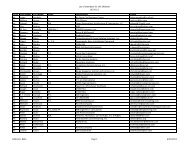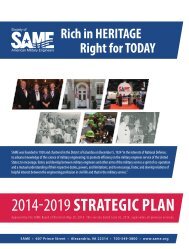Chaim Poran - Directrouter.com
Chaim Poran - Directrouter.com
Chaim Poran - Directrouter.com
- No tags were found...
You also want an ePaper? Increase the reach of your titles
YUMPU automatically turns print PDFs into web optimized ePapers that Google loves.
MCC’s Infrastructure Investments<br />
and<br />
Related Business Opportunities<br />
Prepared for<br />
SAME Webinar – April 26, 2012<br />
Presented by<br />
<strong>Chaim</strong> J. <strong>Poran</strong>, PhD, PE<br />
Director, Infrastructure<br />
cporan@mcc.gov
• Section I: MCC Overview<br />
• Section II: Procurement Process<br />
• Section III: Up<strong>com</strong>ing Business Opportunities<br />
2
• The Millennium Challenge Corporation (MCC) is an<br />
innovative and independent U.S. foreign aid agency<br />
exclusively funded by the US Congress in January 2004<br />
that is helping lead the fight against global poverty.<br />
• Focusing on reducing poverty through economic<br />
growth, MCC is managed by a Chief Executive Officer,<br />
who is part of a nine-member Board of Directors. The<br />
Secretary of State, the Secretary of the Treasury, the<br />
U.S. Trade Representative, and the USAID Administrator<br />
serve on the board along with four private sector<br />
representatives.<br />
3
So… what is MCC<br />
• MCC, as a US Government (USG) agency, is designed to<br />
reduce poverty through economic growth in select number of<br />
developing countries mostly Low In<strong>com</strong>e Countries (LIC) and<br />
some Low-Middle In<strong>com</strong>e Countries (LMIC).<br />
• Limited domain<br />
• Limited time<br />
Good<br />
governance<br />
Economic<br />
freedom<br />
Investments<br />
in people<br />
4
Limited Timeline:<br />
Phases of Compact Development<br />
and Implementation<br />
and their Respective Timeline<br />
About 2 – 3 years<br />
MCC’s Three Core Principles<br />
1. Good Policies Matter<br />
• Support countries who can use<br />
assistance effectively<br />
• Spur private investment and increased<br />
trade, the real engines of growth<br />
2. Country Ownership<br />
• Increases responsibility<br />
• Builds capacity<br />
• Yields better results<br />
3. Focus on Results<br />
• Increase accountability<br />
• Contribute to development success<br />
6
Competitive Selection<br />
• MCC Board examines country performance based on 20 independent<br />
indicators<br />
• Policy indicator categories:<br />
• Ruling justly<br />
• Investing in people<br />
• Economic freedom<br />
• Selection and continued eligibility<br />
are based on policy performance<br />
7
MCC Scorecards<br />
Sample indicators:<br />
• Civil liberties<br />
• Control of<br />
Corruption<br />
• Immunization<br />
rates<br />
• Health and<br />
education<br />
expenditures<br />
• Natural<br />
resource<br />
management<br />
• Land rights and<br />
access<br />
• Number of days<br />
to start a<br />
business<br />
• Inflation rate<br />
Indicator data sources: World Bank Institute, International Monetary Fund, Freedom House,<br />
WHO, UNESCO, Heritage Foundation, International Finance Corporation<br />
8
Where MCC Has Operated Since 2004<br />
9
Where is MCC today<br />
23 Compacts signed to date with about $9<br />
billion <strong>com</strong>mitted in <strong>com</strong>pact funding<br />
20 Countries in the Threshold program<br />
with about $500 million <strong>com</strong>mitted<br />
Focused on implementation and results<br />
Part of America’s “smart power” global<br />
engagement<br />
An important part of the future of US<br />
foreign aid<br />
10
Focus on Monitoring and Evaluation<br />
of MCC’S “SMART AID” Results<br />
• Pre-<strong>com</strong>pact economic<br />
assessments<br />
•Economic rates of return<br />
per project (ERR)<br />
•Beneficiary analyses –<br />
project must result in raised<br />
in<strong>com</strong>es<br />
• Performance monitoring and<br />
adjustments/re-scoping as<br />
needed<br />
• Independent third-party<br />
impact evaluations<br />
11
What MCC Funds<br />
About $9 Billion in 24 Compacts<br />
Other<br />
Investments,<br />
~25%<br />
Admin, ~10%<br />
Infrastructure,<br />
~65%<br />
Transport, 56%<br />
Irrigation, 13%<br />
Water, 14%<br />
Facilities, 11%<br />
Energy, 6%<br />
In the pipeline: Zambia (just approved by the BoD);<br />
2 nd Compacts for Cape Verde (signed), Georgia, Ghana, El Salvador and Benin<br />
12
• Section I: MCC Overview<br />
• Section II: Procurement Process<br />
• Section III: Up<strong>com</strong>ing Business Opportunities<br />
13
MCC PROCUREMENTS<br />
Compact procurements<br />
• Administered by MCA Entities.<br />
• Contract opportunities – all untied<br />
– are published to:<br />
1. http://www.mcc.gov/<br />
2. http://mcc.dgMarket.<strong>com</strong>/<br />
3. http://www.devbusiness.<strong>com</strong>/<br />
MCC corporate procurements<br />
• Administered by MCC.<br />
• Some tied to US <strong>com</strong>panies.<br />
• Opportunities published to<br />
http://www.FedBizOpps.gov/<br />
14
How to do business with MCC<br />
• Take part in MCAs procurements in MCC’s<br />
countries conducted by the MCAs according<br />
to MCC procurement guidelines ICB<br />
(modified from World Bank guidelines)<br />
• Take part in MCC procurements conducted by MCC<br />
head office procurements according to FAR<br />
– ID/IQ Call <strong>com</strong>pleted for 2010 – 2015<br />
– Other calls<br />
• As an ID/IQ contractor to the USACE, participate through<br />
MCC’s Support Agreement (SA) with the USACE, or other<br />
interagency agreements.<br />
15
MCC’s A/E IDIQ Prime and Sub contractors<br />
Period of Performance: 7/28/2010-6/29/2015<br />
PRIME CONTRACTOR<br />
Tetra Tech, Inc<br />
URS Group<br />
AECOM Technical Services<br />
MHW Americas<br />
Environmental Resources<br />
Management<br />
Jacobs Government Service<br />
Company<br />
The Louis Berger Group<br />
SNC - Lavalin International<br />
SUBCONTRACTORS<br />
Associates in Rural Development; Wilbur Smith Associates<br />
Nathan Associates; Development Alternatives Inc; Social and<br />
Strategic Assessment; Sheladia Associates Inc<br />
AECOM International Development<br />
Baker; HNTB; GRM; IRG;TEC; Dexis; UBR; TMG; Naomi<br />
Cassirer<br />
Scott Wilson Ltd<br />
Arcus Gibb; Development Finance International; Garry<br />
Struthers Associates; Hardie Industries; Integral; John Bond<br />
Agland Investment Services; Development & Training<br />
Services; Nexant, Inc; The Urban Institute; Bob Hefferon;<br />
David Moore<br />
TEC, Inc<br />
AMEC; Egis BCEOM; Perkins Eastman; Power Engineering;<br />
Enertech; Ricondo; Zeta-Tech; AMIS<br />
Roche LTEE Groupe-Counceil<br />
16
MCC’s Compact Program<br />
Unique MCC Characteristics<br />
• MCC signs a Compact with the eligible country. The Compact details the<br />
projects to be funded and the implementing arrangements.<br />
• MCC eligible countries form entities (e.g. MCA-Indonesia) which are<br />
responsible for implementing the Compact and selecting contractors.<br />
• Compact funds must be spent within 5 years.<br />
Attractions for Private Sector<br />
• Countries qualify for MCC assistance by supporting an environment<br />
conducive for private sector led growth including control of corruption.<br />
• At “entry into force” of the Compact all funding is obligated, reducing risk to<br />
implementers.<br />
• Vendors paid directly by USG through the Common Payment System<br />
(CPS).<br />
17
Contractor Nationality of all MCC and MCA-<br />
Funded Contracts as of August 31, 2010<br />
(Contracts above $50,000)<br />
Israel, $35,747,360,<br />
1%<br />
Ireland,<br />
$39,976,134, 1%<br />
United Kingdom,<br />
$42,249,413, 1%<br />
Korea, South,<br />
$43,939,350, 1%<br />
India,<br />
$57,629,731, 2%<br />
El Salvador,<br />
$75,625,719, 2%<br />
Armenia,<br />
$80,701,127, 2%<br />
Italy, $84,207,483,<br />
2% Azerbaijan,<br />
$97,414,824, 3%<br />
Honduras,<br />
$108,507,699, 3%<br />
Netherlands,<br />
$113,572,989,<br />
Morocco, 3%<br />
$117,695,777, 3%<br />
Ghana,<br />
$123,457,097, 4%<br />
39 Additional<br />
Nationalities,<br />
$531,634,340, 16%<br />
Canada,<br />
$144,763,852, 4%<br />
United States,<br />
$602,290,504, 18%<br />
China,<br />
$320,013,156, 9%<br />
Portugal,<br />
$146,053,786, 4%<br />
France,<br />
$288,937,104,<br />
8%<br />
Costa Rica,<br />
$200,987,795, 6%<br />
Germany,<br />
$156,793,452, 5%<br />
18
Infrastructure -- Services Procured<br />
By MCC<br />
• Due Diligence<br />
Support<br />
• Feasibility Studies,<br />
EIAs, RAPs<br />
• Independent<br />
Engineering Services<br />
• Specialty Consulting<br />
By MCAs<br />
• Project Management<br />
Consulting<br />
• Feasibility Studies<br />
• SEAs, EIAs, RAPs<br />
• Design & Preparation<br />
of Bidding Documents<br />
• Construction<br />
Supervision<br />
• Construction Works<br />
• Specialty Consulting<br />
19
MCC Model: A More Level Playing Field<br />
• No preferences for U.S. or domestic contractors: Compacts are<br />
“untied”.<br />
• Past experience, environmental, health, safety, labor standards<br />
matter.<br />
• Award decisions made by technically qualified experts.<br />
• Professional independent oversight of contract performance.<br />
• All funds are obligated when Compacts enter into force.<br />
• Contractors paid directly by USG through the Common Payment<br />
System (CPS).<br />
• Checks and balances to guard against abusive discretion.<br />
• Procurements include Bid Challenge System, and contracts include<br />
dispute resolution mechanisms.<br />
20
Compact Implementing Structure<br />
Ensures Sound Fiscal Accountability<br />
MCC<br />
$$<br />
Washington, DC<br />
MCC<br />
Resident<br />
Mission<br />
Host Country<br />
Government<br />
Accountable<br />
Entity (MCA)<br />
Fiscal Agent/<br />
Funds Control<br />
Procurement<br />
Agent<br />
Bank<br />
Account<br />
Common<br />
Payment<br />
System<br />
(Paid from<br />
US Treasury)<br />
PM or CS 1<br />
PM or CS 2<br />
PM or CS 3<br />
$$<br />
Contractor<br />
Contractor<br />
Contractor<br />
21
Evaluation Criteria<br />
Eligibility<br />
• No conflicts of<br />
interest<br />
• No GOEs<br />
• Any nationality (with<br />
few restrictions)<br />
• No debarred and<br />
excluded parties<br />
• No history of nonperforming<br />
contracts or of<br />
litigation<br />
• Other disqualifiers<br />
Technical<br />
• General, similar &<br />
specific experience<br />
• Environmental and social<br />
documents<br />
• Health and safety<br />
documents<br />
• Technical offer – work<br />
program, method<br />
statement, cash flow<br />
projection<br />
• Construction equipment<br />
• Project management<br />
organization & personnel<br />
Financial<br />
• Audited financial<br />
statements<br />
• Size (turnover) in<br />
relation to contract<br />
• Financial ratios<br />
(current ratio, debt<br />
ratio)<br />
• Financial resources<br />
(cash flow<br />
requirement)<br />
• Able to obtain<br />
securities (bid,<br />
performance,<br />
advance payment)<br />
22
MCC Procurement Principles<br />
• Open, fair and <strong>com</strong>petitive procedures<br />
• Solicitations based on clear and accurate<br />
descriptions<br />
• Contracts awarded only to responsible<br />
suppliers and contractors<br />
• No more than a <strong>com</strong>mercially reasonable<br />
price shall be paid<br />
23
Lessons Learned<br />
• Beware reliance on couriers (DHL, FEDEX) for bid deliveries<br />
• IT IS A MCA CONTRACT, SO BE PREPARED TO DIRECTLY DEAL<br />
WITH THE CLIENT (MCA) THROUGH THEIR PROCUREMENT<br />
AGENTS.<br />
• Knowledge of local challenges – teaming is encouraged<br />
• Read the requirements! Ask questions! Submit EVERYTHING<br />
requested in the bidding documents<br />
• Bid Security required – ensure it ac<strong>com</strong>panies the bid<br />
• Advance Payment requires a bank guarantee<br />
• Performance Guarantees required from bank acceptable to the MCA<br />
entity – budget for them<br />
• Price reasonableness – low bid doesn’t always win if it doesn’t make<br />
sense<br />
24
• Section I: MCC Overview<br />
• Section II: Procurement Process<br />
• Section III: Up<strong>com</strong>ing Business<br />
Opportunities*<br />
* The following is not meant to be a specific, <strong>com</strong>prehensive listing of<br />
MCC/MCAs business opportunities but rather a general guideline to<br />
potential up<strong>com</strong>ing opportunities related to infrastructure projects and<br />
activities in MCC countries with significant infrastructure investments. It<br />
does not include <strong>com</strong>pleted procurements.<br />
25
AFRICA<br />
• Eastern and Southern Africa (EASA)<br />
– Zambia: Newest Compact to includes large scale urban<br />
water supply, sanitation, and drainage works in Lusaka<br />
(most of the $355 million Compact) likely up<strong>com</strong>ing MCA<br />
procurements for consultancies and project management,<br />
and then works and construction supervision.<br />
– Malawi: The Compact has been suspended due to democracy issues.<br />
However, with the newly installed president there is the possibility that<br />
the Government of Malawi will appeal MCC for reinstatement of the<br />
Compact. The 2011 Malawi Compact included $350 million focused on<br />
revitalization of the energy sector including about $283 million for<br />
improvement of power supply and distribution, and about $26 million for<br />
sector policy and regulatory reform.<br />
26
• Western Africa (WA)<br />
AFRICA continued…<br />
– Burkina Faso: The $481 million Compact is in its 3 rd implementation year<br />
and includes primary and secondary roads project ($194 million), and an<br />
irrigation/dam rehabilitation activity, for which MCA procurements are<br />
expected for some works and construction supervision projects not yet<br />
procured.<br />
– Cape Verde: The recently signed 2 nd Compact includes a $41 million water,<br />
sanitation and hygiene (WASH) project that includes regulatory and<br />
institutional reform, and an infrastructure grant facility which will involve<br />
MCA procurements for consultancies and project management, works and<br />
construction supervision.<br />
– Senegal: The $540 million Compact is in its 2 nd implementation year and<br />
includes a road rehabilitation project ($324 million), and an irrigation project<br />
($170 million), for which MCA procurements for works and construction<br />
supervision are expected.<br />
27
Europe, Asia, Pacific and<br />
Latin America (EAPLA)<br />
– Indonesia: The $600 million, November 2011 Compact includes a $333<br />
million Green Prosperity Project (GPP) focused on renewable energy. The<br />
GPP is likely to result in MCA procurements for consultancies to prepare<br />
specific projects, and then works and construction supervision.<br />
– Jordan: The $275 million Compact is in early implementation and includes a<br />
total of about $254 million in water supply network, wastewater network, and<br />
wastewater treatment plant expansion projects. MCA procurements for<br />
works is <strong>com</strong>mencing .<br />
– Moldova: The $262 million Compact is in its 2 nd implementation year and<br />
includes an irrigation systems rehabilitation activity ($73 million) for which<br />
MCA procurements for works are expected, and a road rehabilitation project<br />
($133 million).<br />
– Philippines: The $434 million Compact is at the end of its 1 st implementation<br />
year and includes a roads development project ($214 million) for which MCA<br />
procurement for works is underway.<br />
28
Thank you very much !


